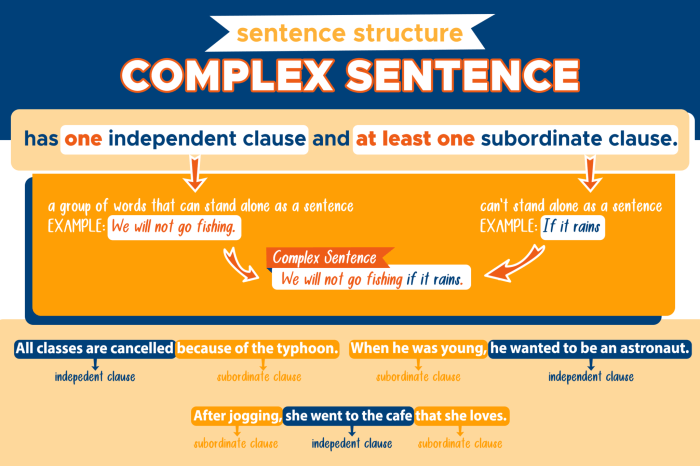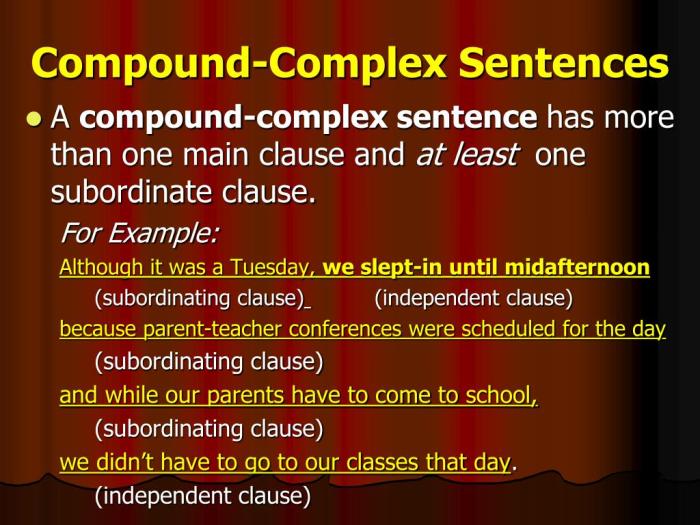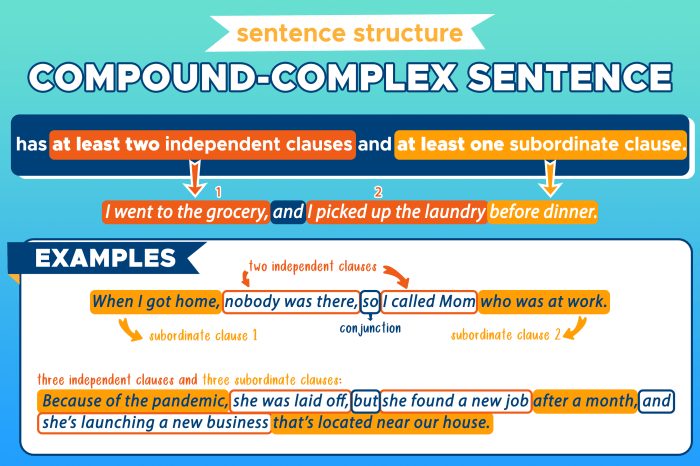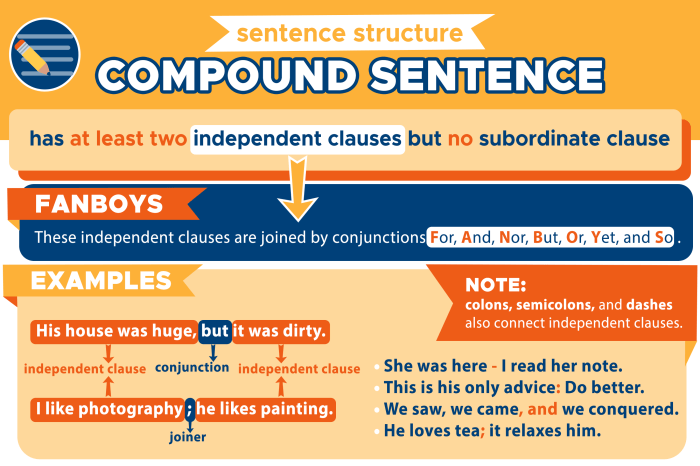Clauses building and refining compound and complex sentences is an essential aspect of effective writing, enabling writers to convey complex ideas with clarity, precision, and impact. This comprehensive guide delves into the intricacies of sentence construction, empowering writers to master the art of crafting compelling and sophisticated prose.
By exploring the fundamental concepts of compound and complex sentences, we uncover the power of coordinating and subordinating conjunctions in connecting clauses. Through practical examples and expert insights, we navigate the common pitfalls and identify strategies for avoiding errors such as comma splices and run-on sentences.
Building Compound Sentences

Compound sentences combine two or more independent clauses into a single sentence. Independent clauses can stand alone as complete sentences. Coordinating conjunctions (such as and, but, or, nor, for, so, and yet) connect the clauses.
Examples of Compound Sentences
- The dog barked, and the cat ran away.
- I like to read, but I don’t have much time.
- The weather was nice, so we went for a walk.
Refining Compound Sentences

Common Errors in Compound Sentence Construction
- Comma splices: Joining two independent clauses with only a comma, without a coordinating conjunction.
- Run-on sentences: Joining two independent clauses without any punctuation or conjunction.
Tips for Creating Effective Compound Sentences
- Use coordinating conjunctions to connect the clauses.
- Make sure each clause is a complete sentence.
- Vary the length and structure of the clauses.
Building Complex Sentences
Complex sentences consist of an independent clause and one or more dependent clauses. Dependent clauses cannot stand alone as complete sentences. Subordinating conjunctions (such as because, although, if, when, while, and that) connect the clauses.
Examples of Complex Sentences
- I went to the store because I needed some milk.
- Although I was tired, I finished my homework.
- If you study hard, you will pass the test.
Refining Complex Sentences

Common Errors in Complex Sentence Construction
- Dangling modifiers: A modifier that does not clearly refer to a noun or pronoun in the sentence.
- Misplaced clauses: A clause that is not placed next to the word or phrase it modifies.
Tips for Creating Effective Complex Sentences, Clauses building and refining compound and complex sentences
- Make sure the dependent clause is clearly related to the independent clause.
- Place the dependent clause next to the word or phrase it modifies.
- Vary the length and structure of the clauses.
Using Clauses Effectively: Clauses Building And Refining Compound And Complex Sentences

Types of Clauses
- Independent clauses: Can stand alone as complete sentences.
- Dependent clauses: Cannot stand alone as complete sentences.
Using Clauses to Add Detail, Variety, and Emphasis
- Add details: Use dependent clauses to provide additional information about a noun or verb in the independent clause.
- Add variety: Use different types of clauses to create variety in your writing.
- Add emphasis: Use clauses to emphasize a particular point.
Examples of Using Clauses Effectively
- Detail:The dog barked because he was hungry.
- Variety:Although I was tired, I finished my homework.
- Emphasis:If you study hard, you will pass the test.
FAQ Corner
What is the difference between a compound and a complex sentence?
Compound sentences combine two or more independent clauses, while complex sentences contain one independent clause and one or more dependent clauses.
How can I avoid comma splices?
To avoid comma splices, use a semicolon, coordinating conjunction, or subordinating conjunction to connect independent clauses.
What are some tips for writing effective complex sentences?
Use subordinating conjunctions to create clear relationships between clauses, vary sentence length and structure, and avoid dangling modifiers.